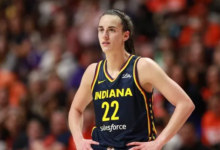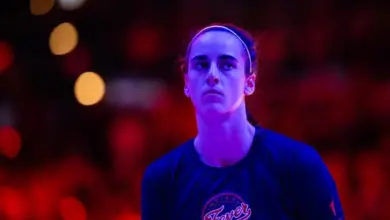Molly Qerim GOES NUTS After Stephen A. & Shannon Sharpe BLAST Her for Caitlin Clark Comments!

The recent debate surrounding Caitlin Clark on First Take, featuring Stephen A. Smith, Shannon Sharpe, and Molly Qerim, has brought to light several important discussions about the WNBA and its players. Smith and Sharpe passionately defended Clark, while Qerim raised concerns about the potential overshadowing of veteran players.
At the heart of the debate is Caitlin Clark, whose rookie season has been nothing short of extraordinary. Her impressive performances on the court, particularly her scoring ability and three-point shooting, have drawn comparisons to NBA stars like Steph Curry. Clark’s ability to generate media buzz and sell out arenas has led Smith to argue that she’s not only a lock for Rookie of the Year but also deserves to be in the conversation for League MVP, a bold statement for a first-year player.
Smith and Sharpe addressed criticism they faced earlier in the season for praising Clark. They argued that the backlash stemmed from the perception that by shining a spotlight on Clark, they were neglecting other deserving WNBA stars like A’ja Wilson and Angel Reese. Smith clarified that their intention was never to undermine the contributions of other players but to highlight Clark’s marketability and the attention she brings to the league. He asserted that Clark’s presence is transformative, suggesting that her influence on the WNBA is profound and deserving of the highest accolades.
On the other hand, Molly Qerim expressed concerns that the intense focus on Clark might come at the expense of recognizing the hard work of veteran players who have built the WNBA over the years. She emphasized the importance of respecting those who laid the groundwork for the league’s success and ensuring that their contributions are not overlooked in the excitement surrounding new talent like Clark.
This debate touches on a broader issue in sports media: how to balance the recognition of emerging stars with the achievements of established veterans. Smith argued that there is no inherent conflict between celebrating a rookie’s impact and appreciating the contributions of long-standing players. He called for a more inclusive recognition of all players’ contributions, suggesting that the league can celebrate new stars like Clark while also honoring those who have laid the foundation for its success.
The rise of Caitlin Clark represents a shift in the WNBA’s visibility and popularity. Her ability to attract attention and engage audiences highlights the evolving landscape of women’s sports. However, this transformation prompts questions about how the league should navigate the balance between promoting new talent and maintaining appreciation for its veteran players.
Smith’s bold claim that Clark deserves MVP consideration as a rookie challenges traditional expectations. The MVP award typically goes to players with consistent excellence over a season, often favoring established stars. Smith’s argument suggests that Clark’s contributions are reshaping the standards for what is considered exceptional in a rookie season.
As the debate continues, it becomes clear that the conversation about Caitlin Clark is not just about one player’s achievements but also about the future of the WNBA and women’s sports as a whole. The discussion reflects broader themes of recognition, media influence, and the challenge of celebrating talent across different stages of a league’s history. The controversy surrounding Clark’s rise offers an opportunity to reflect on how the sports world can navigate these challenges while respecting both emerging stars and established contributors.
In the end, Smith, Sharpe, and Qerim all agree that Caitlin Clark is a remarkable talent who has earned her place in the spotlight. However, the ongoing discourse also reminds us of the importance of balancing that spotlight, ensuring that both new and veteran players receive the recognition they deserve for their contributions to the growth and success of the WNBA.




